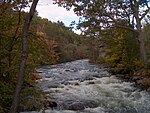Bristol, New Hampshire
Bristol, New HampshirePopulated places established in 1819Towns in Grafton County, New HampshireTowns in New HampshireUse mdy dates from July 2023

Bristol is a town in Grafton County, New Hampshire, United States. The population was 3,244 at the 2020 census. It is home to Wellington State Park, Sugar Hill State Forest, and Profile Falls on the Smith River. Surrounded by hills and lakes, Bristol includes the lower two-thirds of Newfound Lake, a resort area. The primary settlement in town, where 1,911 people resided at the 2020 census, is defined by the U.S. Census Bureau as the Bristol census-designated place (CDP) and is located at the intersection of New Hampshire routes 3A and 104.
Excerpt from the Wikipedia article Bristol, New Hampshire (License: CC BY-SA 3.0, Authors, Images).Bristol, New Hampshire
Pleasant Street,
Geographical coordinates (GPS) Address Nearby Places Show on map
Geographical coordinates (GPS)
| Latitude | Longitude |
|---|---|
| N 43.591111111111 ° | E -71.736666666667 ° |
Address
Pleasant Street
Pleasant Street
03222
New Hampshire, United States
Open on Google Maps








